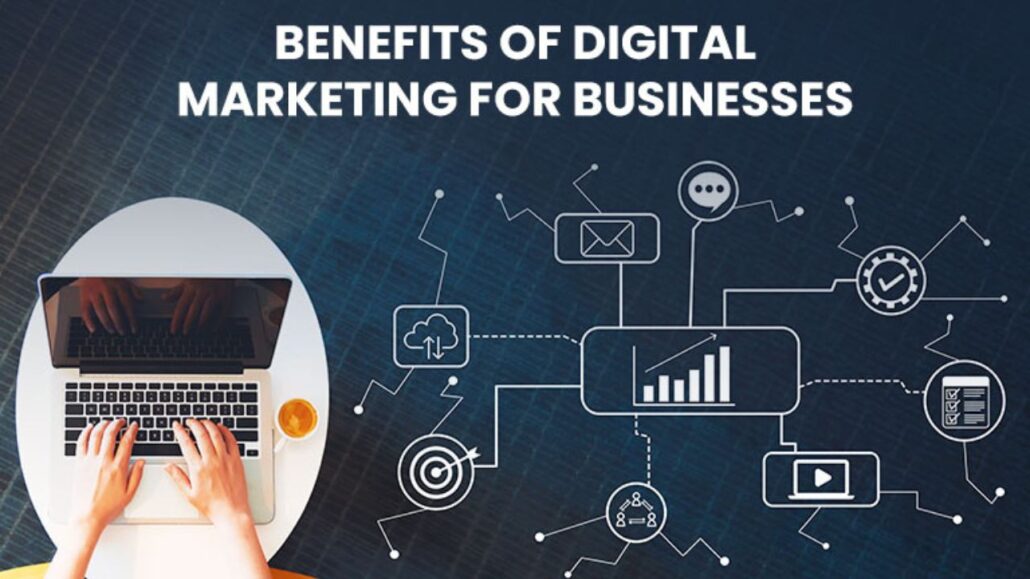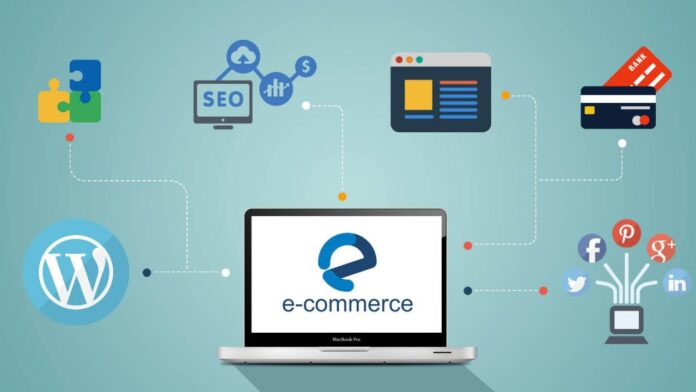Two common rule discussions in the dynamic world of Internet business are “digital marketing” and “e-commerce.” Although these words are frequently used interchangeably, they refer to different elements of the Internet business world.
We will investigate the key distinctions between digital marketing and e-commerce, illuminating their respective modes of operation.
Digital Marketing and E-commerce Defined

We first need to define each concept to understand the differences between digital marketing and e-commerce. All marketing initiatives using an electronic device or the internet fall under the umbrella phrase “digital marketing,” which is quite broad.
It includes strategies like search engine optimization (SEO), social media marketing, email marketing, content marketing, and other approaches.
The major goals of digital marketing are to increase brand awareness, engage potential customers, and drive traffic to websites.
On the other hand, E-commerce refers to the online buying and selling of products or services. E-commerce platforms, which include online markets, shops, and B2B portals, enable transactions.
The primary goal of e-commerce is to facilitate sales and generate revenue directly through online transactions.
E-Commerce VS Digital Marketing Overview
E-Commerce
- A digital store for purchasing products or services.
- There are different types of e-commerce available.
- All the transactions take place online between the consumer and the supplier.
Digital Marketing
- Utilises technology to interact with and reach consumers.
- Used to market products and services to customers.
- Helps increase sales by directing more traffic where it is needed.
Benefits of Digital Marketing

There are numerous benefits to digital marketing. These consist of the following:
- Timeliness: It allows brands to reach their target audience with the right message at the right time.
- Specific targeting: Increased brand awareness and greater customer engagement through targeted advertising.
- Develop brand loyalty: By publishing relevant content to your audience more frequently, your brand can expand quickly.
- Wide-reaching: It offers a wonderful opportunity to advertise your business and services to an infinite audience.
- Improve customer loyalty: It lets you share the latest trends and news with your audience via social media and email.
Goals and Objectives: Divergent Aims
The main goals of digital marketing are to increase brand recognition, draw in new clients, and increase website traffic. It attempts to spark interest and participation, eventually resulting in conversions.
The objectives of digital marketing often revolve around increasing website visits, growing social media followers, and boosting email list subscriptions.
E-commerce, on the contrary, is more concerned with directly generating sales and revenue.
The conversion of website visitors into paying clients is the main objective.
Increasing conversion rates, average order value, and client retention are all goals for e-commerce.
Scope and Reach: The Breadth of Influence
Because it includes a variety of methods that aim to reach a large audience, digital marketing has a wider range of effects. It encompasses all online presences outside of e-commerce and may be helpful for blogs, news websites, and service-focused websites.
Its broad influence impacts prospective clients at several points along the buyer’s journey. While also capable of reaching a vast audience, E-commerce is more focused on converting visitors into customers.
Its influence is more concentrated on the final stage of the buyer’s journey, where the goal is to prompt a purchase.
Strategies and Tactics: The Divergence Begins
Digital Marketing Strategies
Digital marketing strategies include:
- SEO (Search Engine Optimization): Optimising website content to rank higher in search engine results.
- Social Media Marketing: Using social platforms to connect with the audience.
- Email Marketing: Sending personalised messages to subscribers.
Content marketing is the process of producing informative and engaging content.
- Pay-Per-Click (PPC) Advertising: Paying for ad placements on search engines and websites.
- Influencer Marketing: working together to market goods and services with influencers.
E-commerce Strategies
E-commerce strategies include:
- User Experience (UX) Design: Enhancing the online shopping experience.
- Shopping Cart Optimization: Streamlining the Purchase Process
- Product Listings and Descriptions: Providing detailed information about products.
- Payment Processing: Ensuring secure and efficient payment transactions.
- Inventory Management: Keeping track of stock levels.
- Customer Support: Resolving issues and inquiries promptly.
These tactics emphasise the unique methods needed for successful digital marketing and e-commerce.
Each demands its own set of skills and expertise.
Target Audience: Tailoring to Unique Needs
Digital marketing often targets a broader audience, including those in the awareness and consideration stages of the buyer’s journey. Content is designed to educate, entertain, and build trust over time.
E-commerce, conversely, hones in on potential customers in the decision and action stages. The focus is on providing information on items, costs, and reviews that directly impact purchase choices.
Channels and Platforms: Where the Magic Happens
Digital marketing thrives on a variety of platforms and channels. It uses social media platforms, search engines, and content management systems.
The choice of channel depends on the target audience and campaign objectives.
E-commerce predominantly operates through dedicated online storefronts and marketplaces. Platforms like Shopify, WooCommerce, and Amazon provide the foundation for e-commerce firms.
Content Creation: Crafting the Message
Digital marketing relies heavily on content creation. Blogs, social media updates, and educational films are essential for capturing and holding the audience’s attention.
E-commerce centres its content on product descriptions, images, and customer reviews. The objective is to offer thorough information to support decision-making on purchases.
Measuring Success: Metrics that Matter
Numerous measures, such as website traffic, click-through rates (CTR), conversion rates, and social media engagement metrics, are used to measure the success of digital marketing campaigns.
E-commerce success is quantified through conversion rates, average order value, cart abandonment rates, and customer retention rates.
Budget Allocation: Resource Management
Digital marketing budgets are allocated to various channels and strategies based on ROI and campaign goals. Flexibility is crucial to adjusting strategies as needed.
Budgets for e-commerce give top priority to inventory control, website optimization, and customer service.
The money is used to improve the user experience and ensure that transactions go smoothly.
Integration: Making the Two Worlds Collide
Even though e-commerce and digital marketing have separate aims and tactics, they frequently collaborate to accomplish larger corporate objectives.
E-commerce websites are visited because of digital marketing, and this traffic can lead to direct income generation.
Case Studies: Real-World Examples
Let’s examine a few case studies from the real world to learn more about how businesses may benefit from e-commerce and digital marketing strategies.
- Company A: This e-commerce business leveraged digital marketing to increase its website traffic by 50%, resulting in a 20% boost in sales within six months.
- Company B: A digital marketing agency helped an e-commerce store optimize its product listings and implement effective email marketing campaigns, leading to a 35% increase in conversion rates.
Common Misconceptions: Separating Myths from Reality
There are common misconceptions about digital marketing and e-commerce, such as the belief that they
Conclusion
E-commerce and digital marketing are related processes that can work together. E-commerce usually begins where digital marketing ends. Without one another, they may not have achieved the same level of success as they do now.
It is crucial to comprehend the differences between the two to allocate resources and solve problems effectively.
FAQs
Which is Better: E-Commerce or Digital Marketing?
There isn’t a “better” option; they serve different purposes. Digital marketing promotes goods and services online, whereas e-commerce concentrates on online sales.
How is Digital Marketing Similar to E-Commerce?
Both digital marketing and e-commerce operate in the online realm, but their objectives and strategies differ. They can complement each other for business success.
What are Digital Marketing and E-Commerce?
Online marketing initiatives like SEO, social media, and email marketing are all included in digital marketing.
Online purchasing and selling of goods and services is known as e-commerce.
How Important is Digital Marketing in E-commerce?
Digital marketing is essential for the success of e-commerce since it promotes traffic, increases brand recognition, and aids in consumer conversion.
What’s an Example of Digital Marketing?
An example of digital marketing is using Facebook ads to target a specific audience and promote products or services.
Is E-Commerce a Digital Marketing Tool?
No, e-commerce is not a digital marketing tool. It’s a separate online business model focused on facilitating sales.
Why is Digital Marketing Better?
Digital marketing isn’t inherently better; it depends on business goals. It excels at building brand awareness, while e-commerce directly generates revenue through sales. Both are valuable in their own right.



